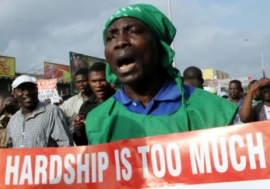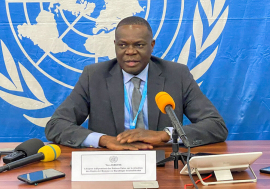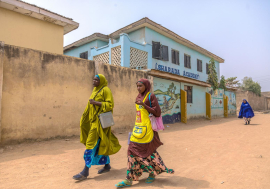Global financial clouds on Africa's horizon
When the value of South Africa's currency, the rand, plummeted in December, local analysts blamed international currency speculators or possible financial contagion from the collapse of the Argentine economy. Around the same time, Argentina's troubles were heightening anxieties among investors in Egypt. A Cairo newspaper cartoon depicted the Egyptian prime minister waking from a nightmare: that he was trying to run Argentina itself. When leaders of West Africa's former French colonies met in Dakar, Senegal, that same month, they had a different worry in mind. Would the advent of a strong European currency, the euro, eventually force them to again devalue their own common money, the CFA franc?
Other international economic trends, including low commodity markets, high foreign debt burdens and reduced aid flows, have already had a profound impact on Africa's small and vulnerable economies. The current world economic slowdown, if prolonged, could seriously dim growth in Africa, although so far the continent has been less severely affected than most other regions.
On top of all this, sharp fluctuations in international financial markets -- including sudden crises like the one in Argentina -- are adding to Africa's worries. Such instability makes it imperative, South African President Thabo Mbeki told his parliament in early February, for African leaders to work with international financial institutions "to fashion a global financial architecture that cushions so-called 'emerging markets' from occasional market irrationality." At a UN-organized International Conference on Financing for Development, held in Monterrey, Mexico, the following month (see article "Is African aid set to rise again?), Algerian President Abdelaziz Bouteflika observed that "massive movements of speculative capital," among other international financial trends, "generate instability, imbalances and crises." He also called for a new monetary and financial system "at the service of healthy and sustainable growth."
In similar terms, the New Partnership for Africa's Development (NEPAD), the continental development strategy now actively promoted by Mr. Mbeki, Mr. Bouteflika and other African presidents, urges "a global financial architecture that rewards good socio-economic management."
Erratic capital and money markets are also stirring alarm in major financial centres across the globe. When the leaders of the world's most powerful countries and corporations gathered in New York in early February for their annual World Economic Forum, the overall mood was sombre. The fact that it was held in a city that had only recently suffered from a devastating terrorist attack tended to mute the celebratory mood of previous such forums in Davos, Switzerland. But so did the collapse of the US energy-trading giant Enron, the crisis in Argentina and uncertainties about the world economic slowdown.
Do abrupt and uncontrollable financial crises lie in Africa's future? How can the "international financial architecture" be restructured to avert them?
The period of "irrational exuberance" in capital markets during the 1990s is now over, remarked one of the forum participants, Mr. Robert D. Hormats, vice-chairman of Goldman Sachs International, a leading Wall Street investment house. "A new sense of realism has descended on us, and we realize we're all in peril."
'Africa should be concerned'
The debates over managing sudden fluctuations in private capital flows are of greatest immediate interest to the larger "emerging markets." Africa has relatively few of those -- chiefly South Africa, Egypt, Nigeria and a handful of others. For many of the poorer countries of Africa, the problems in Buenos Aires and even Johannesburg seem remote. Since they are not well-integrated into global financial networks, they are now shielded somewhat from the most immediate effects of such instability.
But as African countries develop more -- and attract greater investor interest -- similar issues will inevitably confront them as well. Some already are starting to wonder what pitfalls may lurk ahead. Do abrupt and uncontrollable financial crises lie in their own futures? How can the "international financial architecture" be restructured to help avert them? Is more extensive participation in the globalization process worth the risk?
Even today, the instability of financial markets can seriously affect African economies, notes Capital Flows and Growth in Africa, a study by the UN Conference on Trade and Development (UNCTAD). Its analysis of short-term capital flows in 15 African countries, both large and small, shows that such movements can have a greater impact than might be expected from their size alone, because currency and financial markets are "rather thin in most countries." Although these flows in Africa did not exhibit the same kind of boom-bust cycle as in Latin America and Asia, UNCTAD reports, there still was increased instability of short-term flows in Africa during the 1990s, compared with the previous decade.
As Mr. Fantu Cheru, professor of African and development studies at American University in Washington, observed in an interview with Africa Recovery, no African country can be "immune from any fallout" from an international financial crisis. Yet so far, he noted, Africa -- with the exception of South Africa -- is not deeply involved with such issues, in part because it remains on the margins of the main financial markets. But overall, said Mr. Cheru, the problems are grave enough that "Africa should be concerned."
Deregulation and crises
The past decade has been marked by repeated financial crises, in Mexico, East Asia, Russia, Brazil, Turkey and now Argentina. Many economists associate this turbulence with the increasing importance of short-term capital flows, as regulation of both domestic and international capital markets has been greatly liberalized. Unlike foreign direct investment (FDI), which goes into long-term fixed assets -- factories, farms and other productive activities -- investments in stocks, bonds, currencies and other tradeable financial instruments generally seek very quick profits, and are fickle.
According to some estimates, global foreign exchange transactions mushroomed from $4,600 bn in 1977 to $375,000 bn in 1998. In the latter year, over 80 per cent of the turnover involved "round trip" flows of a week or less, primarily speculation on movements in currency exchange rates and the prices of stocks and bonds in different markets, along with efforts to exploit discrepancies in interest rates between countries. Slight changes in investor confidence, exchange rates or interest rates can send billions of dollars rushing from one country to another.
Such short-term flows, together with FDI, helped fuel investment booms in a number of emerging markets during the early and mid-1990s. Except for a small portion that went into the stockmarkets of South Africa, Egypt and a few other countries in Africa, they generally bypassed the continent. Although FDI to Africa increased from $9 bn to $11 bn between 2000 and 2001 -- at a time when global FDI inflows dropped by nearly half -- this was still just a tiny fraction of the $760 bn total worldwide. And most of it went into just a handful of African countries with extensive oil or mineral reserves.
More seriously for poorer African countries, notes UN Secretary-General Kofi Annan, this investment surge has contributed to a "mistaken belief" in donor countries that private capital flows would render official development assistance "obsolete," contributing to the sharp fall-off in aid flows over the same period.
Even for recipients of large private capital flows, the outcome has not always been positive. With weak financial institutions and little control over external capital movements, several East Asian "tigers" suddenly were thrown into crisis in mid-1997. Currencies collapsed, economies contracted, businesses went bankrupt, banks were left holding uncollectable loans, poverty spread massively, and in Indonesia widespread unemployment contributed to the downfall of the long-time president.
In weighing the lessons of the East Asian crisis, many economists pointed to a number of local factors: weak banking sectors, poor market information and extensive "crony capitalism," in which politically connected businessmen were able to secure huge, but risky, loans. Yet even strong advocates of liberalization also cited excessive deregulation of capital markets as a problem. Some also blamed the insistence of the International Monetary Fund (IMF) that countries push up interest rates (in order to draw back foreign capital), a policy that succeeded instead in driving the East Asian economies deeper into recession.
The shockwaves of the Asian crisis extended far beyond the region. Skittish short-term investors began pulling out of other troubled markets, worsening the crises that soon broke out in Russia and Brazil. Africa, because of its less-developed ties with the world economy, was less seriously affected, except through a sharp decline in African commodity exports to Asia and the instability that infected South Africa's financial markets.
'A perverse economic model'
Then came Argentina's collapse late last year. The falldown was all the more dramatic in that Argentina is Latin America's second largest economy, and once boasted a very robust industrial sector and some of the highest living standards on the continent.
In 1991, with strong encouragement from the US Treasury Department, Argentina's leaders sought to tame high inflation by essentially "dollarizing" their economy: the value of the peso was fixed to that of the US dollar, at a rate of one-to-one. Over the decade, the government also privatized most of the public sector -- including education and health -- and deregulated financial markets across the board.
For a while, economic growth was stimulated by an influx of privatization dollars and speculative capital. But about four years ago, the economy started to slow. One problem was that the US dollar rose in value internationally, dragging with it the Argentine peso. That made Argentine exports more expensive -- and less competitive -- on world markets, hurting local industry.
If Asia, Africa and Latin America remain silent, nothing will happen. "Why don't African countries raise the issue of the international monetary system?" asks Professor Robert Mundell.
By December 2001, Argentina's difficulties reached a breaking point. President Adolfo Rodríguez Saá declared a moratorium on payments on his country's $132 bn debt, the largest public default ever. For Argentines -- one-fifth of whom had been driven below the poverty line -- conditions became so bad that Buenos Aires and other cities were swept by bitter protests, resulting in numerous deaths. President Rodríguez resigned. Within just a fortnight, three successors came and went, before Mr. Eduardo Duhalde finally settled in as president. "Argentina is bust," he admitted, and is moving to the "verge of disintegration and chaos."
How had things reached such a state -- in a country that so often had been cited as a free-market success story? Officials at the IMF, US Treasury and the Group of Seven (G-7) industrialized countries tended to point fingers at Argentina's leaders, for corruption, mismanagement and refusing to cut back public spending sufficiently. Some economic analysts blamed the inflexible currency peg. Conservative US politicians accused the IMF of lending Argentina too much, for too long.
President Duhalde thought the problem lay with the policies of his predecessors, in a "perverse economic model" that, "in its agony, dragged everyone down with it." More bluntly, Venezuela's outspoken President Hugo Chávez, who in January became chairman of the developing countries' Group of 77, said that month: "Argentina is a country that is suffering from an overdose of the poison of neo-liberalism."
Rand 'attack'
Around the same time that Argentina was going into a deep slide, South Africa's currency, the rand, dropped dramatically in international value. It had already started to decline somewhat earlier, but during the last quarter of 2001 it fell by a sharp 24 per cent against the US dollar. During a few weeks in December, the rand's value abruptly rose and fell several times.
At first, market analysts and government officials were at a loss to explain the rand's fall. The "fundamentals" of South Africa's economy and economic management were widely considered to be sound, and stock analysts and traders alike used terms like "ludicrous" and "insane" to describe the rand's market performance. Some thought that perhaps investor confidence had been shaken by Argentina, the political turbulence in neighbouring Zimbabwe or the slow pace of South Africa's privatization programme. Finance Minister Trevor Manuel discounted these as significant explanations.
Then in early January, Mr. Kevin Wakefield, the chief executive officer of the South African Chamber of Business (SACOB), blamed currency speculators. He accused "market manipulators" of using "dubious financial methods" to attack the rand with the aim of earning quick profits in currency trades for themselves. He urged the government to investigate the possibility of illegal or unethical speculative activities and provided it with a confidential report with details of SACOB's allegations.
The government named a respected jurist, Mr. John Myburgh, to head a commission of inquiry. Its mandate is to investigate South African currency trading during 2001, to detect if there were indeed attempts to manipulate the rand's value, and by whom. The commission has been given until the end of April to report back.
Whatever the ultimate findings of the Myburgh Commission, South Africa's experience brings renewed attention to the problems of currency speculation, one of the factors that had helped precipitate the crises in Asia.
Essentially, currency speculators -- clearing banks, investment houses, hedge funds and rich individuals -- gamble on fluctuations in world currencies, betting, for example, that the rand may be devalued against the dollar in the near future. They take out local rand loans, convert them to dollars, and, following devaluation, buy back cheaper rands to pay off the loans, with a hefty profit left over. With the prevalence of 24-hour electronic financial markets, massive shifts can take place very quickly. If enough speculators act the same way, the value of the local currency can plummet dramatically -- an "attack" in the jargon of market traders.
CFA and the euro
More than a dozen former French colonies in Africa use a common currency, the CFA franc. Because the franc's exchange rate is fixed, these countries are much less vulnerable to currency instability. At the 3-8 March African Development Forum, organized in Addis Ababa, Ethiopia, by the UN Economic Commission for Africa, Columbia University's Professor Robert Mundell, a Nobel Prize laureate in economics, urged them to continue pegging their franc to the euro. (Through its earlier link with the French franc, the CFA first became fixed to the euro in 1999, and is now set at a rate of CFA656 to Euro1.)
Such a peg, Mr. Mundell argued, means that the economies of the CFA countries are "islands of stability" in an unstable financial world, and have very little inflation. As a result, they are generally more attractive to foreign investors than are countries with similar resources and infrastructure, but with less predictable exchange and inflation rates. Having a stable monetary system does not necessarily bring economic growth and development, he cautioned, but it does "get rid of a distraction" and allows governments and businesses to make more reliable long-term plans.
Originally created in the 1940s as a colonial currency, the CFA survived the transition to independence. It kept its peg to the French franc and its convertibility was guaranteed by the French treasury. The fourteen countries that use the CFA retain their foreign-exchange reserves in two central banks, one in Dakar, Senegal, for the West African zone, and one in Yaoundé, Cameroon, for Central Africa. Because the money supply is controlled by these central banks, national governments cannot overcome budgetary problems by simply printing more money, a restraint that further contributes to the CFA's stability.
But fixing a local currency to a stronger international one sometimes brings its own problems, as Argentina saw with the peso's peg to the US dollar. The same thing happened before with the CFA franc. At the time of its creation, the value of the currency was fixed at CFA50 to 1 French franc, a rate that was maintained for nearly half a century. But in the late 1980s and early 1990s, the value of the French franc increased against other world currencies, contributing to the CFA's appreciation as well. This overvaluation, combined with other economic difficulties, led to serious financial problems.
In January 1994, under heavy pressure from the IMF and World Bank, the French treasury finally agreed to use its leverage with the CFA governments to push through a devaluation of the CFA franc by half, pegging the new rate at CFA100 to FF1. In CFA terms, these countries' debts suddenly doubled, while the cost of imports skyrocketed, bringing several years of relatively high inflation. Since the devaluation also made local exports more competitive, however, most CFA economies eventually were able to recover.
Still, the memory of the devaluation remains a traumatic one. Fueled by speculative rumours that the advent of the euro could again affect the CFA's value, anxieties about a second devaluation were very much in the air when West African leaders gathered in Dakar in December for a summit of the eight-member Union économique et monétaire ouest africaine (UEMOA, West African Economic and Monetary Union). UEMOA President Moussa Touré sought to dispel concerns by noting that the euro already had been in circulation since 1999, with no adverse impact on the value of the CFA.
Mr. Touré and other UEMOA officials cautioned, however, that there simply are no guarantees of long-term monetary stability. Shifts in value between the euro and other international currencies, disparities in economic growth among the UEMOA's member-states, and world market trends could all influence the strength of the CFA franc. At a minimum, Mr. Touré said, there probably would be no devaluation "over the next three-to-four years."
Africa needs a voice
Africa must be better prepared to handle the impact of global financial instability, experts agree. It also must ensure that its particular concerns are taken into account in the ongoing international debates over the effectiveness of foreign aid, the mechanisms for debt relief, and the institutions and procedures needed to help prevent financial crises. If Asia, Africa and Latin America remain silent, nothing will happen, Mr. Mundell told the conference in Addis Ababa. "Why don't African countries raise the issue of the international monetary system?"
In fact, some countries have tried to do just that. Nine African states belong to the intergovernmental Group of 24, set up in 1971 to present developing countries' views on international financial issues. Through that forum, they have pressed, among other things, for national capital controls, new emergency financing facilities, regulation of hedge funds and offshore financial centres, and more seats on the IMF Executive Board -- sub-Saharan Africa now has only two seats, compared with eight for Western Europe, for example. But most such proposals have been rejected by the G-7 countries, notes Mr. Aziz Ali Mohammed of the G-24 liaison office in Washington.
Mr. Yilmaz Akyüz, an analyst at UNCTAD, concurs. There have been various proposals by governments, economists, non-governmental organizations and even international financiers for quite major reforms, including a currency transaction tax to curb volatile short-term capital movements and the establishment of a new "global mega-agency" to regulate, supervise and set standards for financial institutions worldwide. So far, however, such "big ideas ... have not found favour among the powerful." Most of the changes now under consideration, he adds, are piecemeal and marginal, and fail to address "systemic instability and its consequences."
While the views of developing countries, as a group, are rarely taken into account at major international meetings (with the exception of UN conferences like the one in Monterrey), African states have a particularly hard time gaining a hearing. When leaders of the industrialized countries gather, they "only talk about themselves when they tackle world economic issues and keep the African continent on the periphery," commented a document on the New Partnership for Africa's Development circulated at the World Economic Forum in New York.
The NEPAD programme, developed last year as a continent-wide strategy, seeks to assert African leadership of the region's development. While focusing overwhelmingly on Africa's domestic efforts, it also ultimately envisages a more active African role in reshaping global economic relations. Africa, it affirms, will strive for "governance reforms of multilateral financial institutions," both to ensure greater African representation and to help them "better cater for the needs and concerns of countries in Africa."















